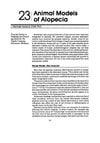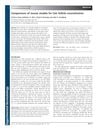Effects of Topical Application of EGCG on Testosterone-Induced Hair Loss in a Mouse Model
July 2011
in “
Experimental Dermatology
”

TLDR Applying EGCG on the skin can prevent hair loss caused by testosterone in mice.
In the 2011 study, researchers examined the impact of epigallocatechin-3-gallate (EGCG) on hair loss in a mouse model caused by testosterone. The experiment involved 60 female mice treated with testosterone and/or EGCG topically for 12 weeks. Results showed that testosterone injections led to hair loss by promoting apoptosis in hair follicles, while EGCG application significantly reduced this effect. EGCG was found to lower the expression of the androgen receptor in hair follicles without affecting certain enzymes related to testosterone metabolism, and it did not change serum and tissue levels of testosterone and dihydrotestosterone. The study concluded that EGCG could prevent testosterone-induced hair loss by decreasing apoptosis in follicular cells and might also encourage hair regrowth, indicating its potential as a treatment for androgenic alopecia.









